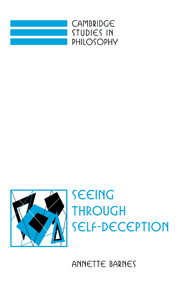Book contents
- Frontmatter
- Contents
- Acknowledgments
- Introduction
- 1 Other-deception
- 2 Two models of self-deception
- 3 The need for an alternative model of self-deception
- 4 Functioning to reduce an anxiety; satisfying a desire
- 5 Self-deceptive belief formation: non-intentional biasing
- 6 False consciousness
- 7 Intentional and non-intentional deception of oneself
- 8 Irrationality
- 9 What, if anything, is objectionable about self- and other-deception?
- References
- Index
9 - What, if anything, is objectionable about self- and other-deception?
Published online by Cambridge University Press: 09 November 2009
- Frontmatter
- Contents
- Acknowledgments
- Introduction
- 1 Other-deception
- 2 Two models of self-deception
- 3 The need for an alternative model of self-deception
- 4 Functioning to reduce an anxiety; satisfying a desire
- 5 Self-deceptive belief formation: non-intentional biasing
- 6 False consciousness
- 7 Intentional and non-intentional deception of oneself
- 8 Irrationality
- 9 What, if anything, is objectionable about self- and other-deception?
- References
- Index
Summary
“Most of us agree that there is something objectionable about self deception,” but we do not agree about what is objectionable. This lack of agreement stems in part from a lack of agreement about what self-deception is. Self-deceivers have been charged, for example, with falseness of heart, insincerity, and hypocrisy, yet these require an intentionality that some of us argue is lacking in self-deception.
I take the most telling of the charges against self-deception to be that of epistemic cowardice. One who self-deceives oneself is, as Johnston points out, accused “of mental cowardice, of flight from anxiety (or angst), a failure to contain one's anxiety, a lack of courage in matters epistemic.” The self-deceiver is “held responsible for an episode that evidences a defect of character, in this case a lack of the negative power that is reason, i.e., the capacity to inhibit changes in beliefs when those changes are not grounded in reasons.”
While the charge of epistemic cowardice is always an appropriate one to level against self-deceivers, and epistemic cowardice is a non-admirable character trait, having this trait is not, I contend, sufficient for prima facie moral badness. I claim, moreover, that self-deception is not always prima facie morally bad, nor is other-deception always prima facie morally wrong. Neither deception is in all cases morally objectionable. I shall first look briefly at other-deception.
Interpersonal deceiving is intentional activity; it is appropriate to ask whether it is prima facie morally wrong.
- Type
- Chapter
- Information
- Seeing through Self-Deception , pp. 158 - 175Publisher: Cambridge University PressPrint publication year: 1998



